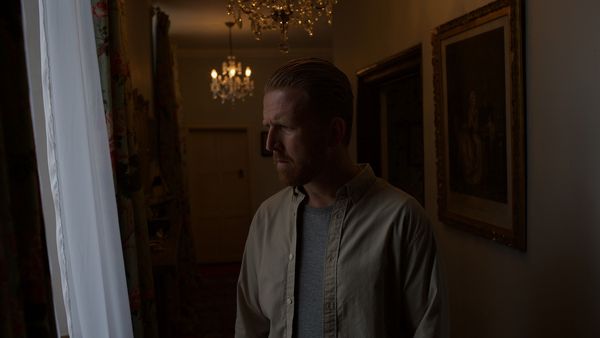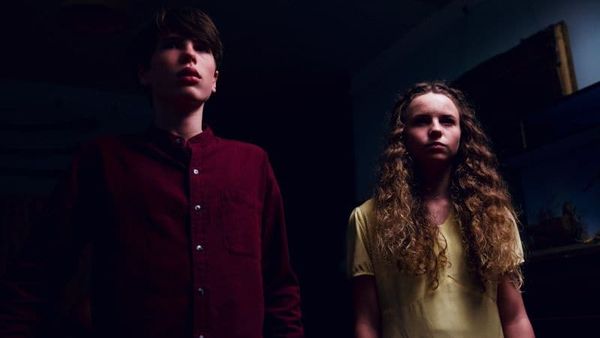 |
| Tom Goodman-Hill as Richard in Homebound Photo: courtesy of Glasgow Film Festival |
Following the shy but well-intentioned Holly (Aisling Loftus) as she travels with her fiancé Richard (Tom Goodman-Hill) to meet his three children for the first time, Sebastian Godwin's Homebound, which is screening in the Frightfest strand at this year's Glasgow Film Festival, is one of those odd little films which doesn't quite fit comfortably into any genre, but whose very peculiarity gives it a wonderful freshness. It features some great performances, especially from the children, but also depends heavily on its striking setting, the house in which they live.
When I ask Sebastian how he managed to find that house, he laughs and says "With great difficulty!" – but goes on to expand on the process.
"It took a very long time. Partly because we really wanted to find the house that, as you said, had that had a kind of special atmosphere, and was big enough and grand enough to hold the story. And somehow wasn't just about a wealthy family but also had a kind of an evocative feel to it. So it did take a long time to find it. And then finally, I think I, someone must have mentioned this house in Norfolk. So I was driving around and went to go and see it. And there's a very eccentric character, Desmond, who owns the house. He was actually featured, I think, in Normal For Norfolk, the BBC TV series. Anyway, so I knocked on the door, and he showed me around, and he was very welcoming and very up for it. And he agreed to let us shoot the film.
"I think what was so amazing about the location is it really was as we found it, and we didn't have to do very much with the production design. It was it was kind of Bohemian."
I mention that I like the film for the way that it turns the stereotype of the stepmother on its head, when the stepmother is usually the wicked character.
"Absolutely, definitely," he says. "It's funny, I went to film school in Poland, originally, where I trained, and I had a teacher who said, 'You should make films about things that either you're afraid of or that you are scared of.' And I always felt like I've been quite afraid of family and how alien other families can be, but also how alien they can make an outsider feel. And what's the great outsider role coming into a family? I think the stepmother is a kind of a classic fairytale idea of the outsider. So I think yeah, it kind of came from that, and the missing mother played on that."
I tell him that I find it interesting because of the way that to begin with, it seems as if she's going to be a stranger to the children, but she ends up finding that she's more of a stranger to her boyfriend in some ways, and that that relationship is not what she thought it was.
 |
| Sebastian Godwin: 'One person's normal is another person's completely and utterly unacceptable or bewildering' Photo: Courtesy of Glasgow Film Festival |
"Absolutely. I think that's so true. We talked about this idea that if they hadn't gone back there, then maybe their relationship would have been fine. But in a sense the going back to a family home like that does reveal things, in the same way if you go back to someone else's partner's family, you can have quite a complicated thing where you have to find out things that perhaps they themselves... I don't know. I think you're absolutely right, but she does find out stuff about him that is obscene, you know – not just uncomfortable but really horrendous and awful."
We discuss the way that a lot of what happens in the house seems to follow the children's rules.
"To go back to what I was saying about other families, what is one person's normal is another person's completely and utterly unacceptable or bewildering," he says. "I think for me in my childhood, and even now to an extent, going round to other people's families and homes and trying to understand their own quirks and rules and behaviours, I think it's not always easy. But I think with the kids' behaviour, I mean, the story is really about the kids, let's say they're hiding something and they're not even understanding their own behaviour. And as the story goes on it turns a little bit expose who's responsible for this and how the dad for instance, perhaps indirectly, is somehow responsible for their behaviour. It's a complex question. It is a psychoanalytical question too in terms of family dynamics and who is responsible for what, and where behaviour comes from."
There are scenes of violence against children in the film which some viewers will find hard to watch. Were they difficult to film?
"We had a great stunt coordinator who's very experienced, who very much helped us choreograph all of those types of things. It's a matter of breaking it down into individual shots, of which each Individual shot is very safe and very controlled, which enables one to be able to make it seem like, perhaps something worse is happening than maybe it actually is."
How did he find the children for the film? They seem like very difficult parts to cast.
"They were difficult. I guess. We had an amazing casting director, Jessie Frost. We saw a lot of a lot of children. And also, you know, if you know Raffiella Chapman, who was the youngest, is now the most experienced of us all in terms of film and TV experience. So it was a mixture of people who had no experience before and other kids who're actually quite experienced. But it was essentially through working through lots of different photographs and auditions, finally, finding those three kids."
Did he work with them as a unit to get to the point where they had that chemistry?
"Yeah. I mean, it was a very low budget film, so we didn't have much time. That's another thing with it which made it even even luckier that they were so great, quite natural, quite quickly. And the adult actors really helped to create that very comfortable atmosphere for them all."
So how does he feel about the film making it to Frightfest?
"I'm thrilled, really happy," he says, "and I have yet to see it in an audience. It was Fantastic Fest and Beyond Fest last year, but we weren't able to be there, so it's really exciting to finally have the prospect of watching it in an audience"
I can see why it's been picked up by Frightfest, I say, but when I first saw it, I didn't really think of it as a horror film. I think that the horror, for me, was in what has come to seem ordinary to the children and to the family.
"I think that's a really good point. That's so true about what's normal for them, and how how sad that is. But yeah, I mean, the horror thing is..." He pauses for a moment. "I made a short film called The Girls and in a sense I wasn't sure what the genre was, as such, but I remember afterwards, there was a very strong sense of 'Wow, this is a perfect horror film!' And I think from then I realised that horror is such a fantastic way to tackle the issues and questions I think we've just been talking about. It can be quite subversive, quite punk, and I think that is really effective."
Does that mean that he's planning to make more horror films in future?
"I'd love to make more horror films," he says, "but I'm having lots of ideas about the films I want to make, and hopefully I'll get the opportunity to do that, but I suspect that probably I will follow the trajectory of exploring incendiary family dramas. That seems to be my particular interest."
Homebound screens at the Glasgow Film Festival on 11 March and will be in cinemas across the UK from 1 April.
Watch a clip from the film below:





















